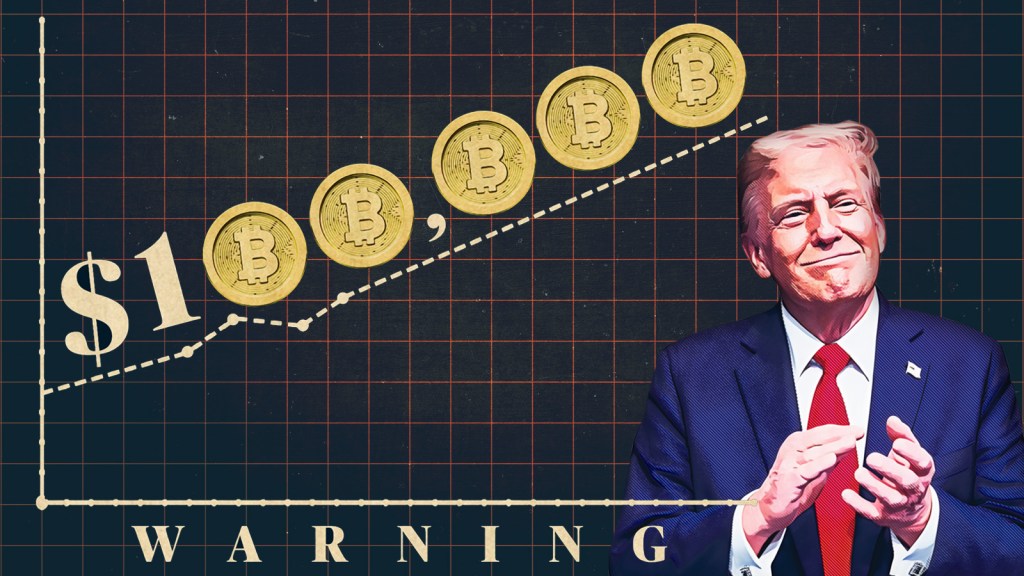Is the Bitcoin Surge Influenced by Trump’s Remarks?
Bitcoin’s price surpassed $100,000 for the first time on Thursday, largely attributed to former President Donald Trump’s expressed enthusiasm for cryptocurrencies.
This year, Bitcoin has experienced significant growth, doubling in value and rising by more than 50% since the U.S. elections. This surge has attracted the attention of many ordinary investors; approximately one in eight adults in the UK now owns cryptocurrency, with an average investment of £1,842, as reported by polling firm YouGov and the Financial Conduct Authority (FCA).
Despite its growing popularity, views on Bitcoin and other cryptocurrencies remain divided. Advocates tout the potential for explosive returns, citing numerous success stories of substantial profits.
Conversely, skeptics, including the FCA, caution that cryptocurrencies are highly unstable and largely unregulated. They advise caution, emphasizing that investors should be prepared to potentially lose their entire investment, given the minimal consumer protection available.
If you are considering investing in Bitcoin, here’s what you need to know:
Current Landscape
There’s a clear trend of increasing interest in Bitcoin, even from figures like Trump, who previously criticized it. Last week, he claimed credit for Bitcoin’s record-high value and expressed ambitions to position the U.S. as the “crypto capital of the world” during his campaign.
Bitcoin, introduced in 2009, is the first cryptocurrency and commands over half the total cryptocurrency market. Unlike traditional currencies, cryptocurrencies are not issued by central banks; instead, they are generated, or mined, through computational processes based on complex algorithms. Importantly, there is a limited supply of these coins, which are recorded on a blockchain database.
While Bitcoin and similar cryptocurrencies may not be widely accepted in everyday transactions, some niche businesses do accept them.
Ben Yearsley from Fairview Investing states, “Bitcoin is entirely speculative and lacks any physical backing; my recommendation is to avoid purchasing it. If you do invest, don’t be driven by fear of missing out, especially when prices are soaring.”
How to Acquire Bitcoin
Purchasing Bitcoin was once a daunting process requiring a digital wallet and peer-to-peer trading. However, platforms like Coinbase and Gemini have simplified this through user-friendly apps and websites. Digital banks such as Revolut also provide cryptocurrency trading options.
Most of these platforms require users to provide personal information and identification for account creation, often including questions to ensure users understand the risks involved with cryptocurrencies.
Transaction fees typically apply when buying or converting Bitcoin. For example, eToro, a prominent crypto trading platform, charges a 1% fee for asset transactions and a 2% fee for crypto transfers.
New investors may begin by purchasing Bitcoin with cash via debit or credit cards. As of Thursday, one Bitcoin cost over $100,000 (approximately £78,400), but fractional purchasing is possible, with some exchanges allowing investments as low as £10 (which represents 7,840th of a Bitcoin).
It’s crucial to note that the cryptocurrency market is unregulated in the UK, meaning investors lack recourse to the Financial Ombudsman Service for grievances and are not eligible for compensation under the Financial Services Compensation Scheme, which typically covers deposits with regulated firms up to £85,000.
For those contemplating a Bitcoin investment, it’s advisable to work with firms regulated by the FCA, ensuring compliance with standards for anti-money laundering and other regulations. Notable firms like eToro, Kraken, and Revolut maintain this status and should be preferred over lesser-known exchanges that might pose risks of scams.
Yearsley further advises, “Select reputable exchanges when buying Bitcoin, but always be prepared for the possibility of losing your entire investment.”
Financial advisor Justin Modray adds, “Use exchanges to convert funds, and remember that if an exchange goes out of business, your investment could be lost as well.”
Future of Bitcoin’s Price
Crucially volatile, cryptocurrency investing often relies on luck. Modray emphasizes that, unlike traditional investments with underpinnings in company cash flow and tangible assets, Bitcoin’s value hinges on market demand and supply dynamics, which could fluctuate based on its acceptance as a regular payment mechanism.
Past crypto crashes, notably in 2022, highlighted the risks, as many lost substantial sums due to the failures of major exchanges like FTX, which collapsed in November 2022, leading to dramatic losses for investors and a significant drop in Bitcoin’s price.
“The market is heavily influenced by speculation; prices can soar through demand but plummet in panic selling, and future performance will depend on public interest and regulatory actions,” warns Modray.
Potential investors should be wary of jumping into Bitcoin, as suggested by Laith Khalaf from AJ Bell, who recommends limiting cryptocurrency investments to no more than 1-2% of an overall portfolio.
“While riding the Bitcoin hype can be beneficial if timed correctly, it can lead to losses if purchased at market peaks. Consider diversifying your investments rather than pursuing high-risk opportunities solely for potential high returns,” he adds.
Tax Implications
Gains from cryptocurrency transactions are subject to capital gains tax (CGT), and the recent budget increased these rates. Basic-rate taxpayers face an 18% CGT (up from 10%), whereas higher and additional-rate taxpayers will incur a 24% tax rate (up from 20%).
Each taxpayer is entitled to an annual CGT-free allowance of £3,000. HM Revenue & Customs treats cryptocurrencies similarly to stocks and has intensified efforts against those who fail to report gains in their self-assessment tax returns, due by January 31 for the prior tax year ending in April.




Post Comment